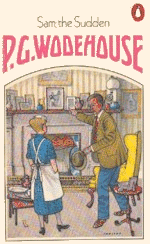Sam the Sudden

An Appreciation of Sam the Sudden
Wodehouse's readers tend, as is natural, to have favourite characters. Some enjoy the Ukridge stories, while others (of whom I'm one) find him irritating. Many readers are first introduced to Wodehouse via the Jeeves & Wooster stories (often after having seen the excellent TV adaptations featuring Stephen Fry as Jeeves and Hugh Laurie as Bertie Wooster), and it's not surprising that the Jeeves & Wooster stories often remain their favourites. Others (again, I'm one), while not disliking Jeeves & Wooster, prefer the Blandings stories. Even among the 'lesser' works, there are some that have the capacity to polarise opinions: Laughing Gas and French Leave are two that arouse contrasting feelings.
But, of all the works in the canon, one rarely hears a word said against Sam the Sudden, and there are a good few of us who rank it among our favourites.
And the question is, why? What is it about Sam the Sudden that appeals to so many people, whose tastes are otherwise rather different? Here are some of my thoughts on the subject.
First, perhaps, is the cast of characters. And here's something of a novelty — no aristocracy, no landed gentry or moneyed classes. It's true that there is a peer, Lord Tilbury, but he's a self-made man and, except that it partly accounts for his pomposity, his peerage is an irrelevance. It's also true that Sam has a wealthy uncle, but the story starts with him being sent out into the big bad world to make his own way — no silver spoon in the mouth for Sam. And though the girl Sam falls in love with, Kay Derrick, comes from a background of wealth and privilege, her father, before he died, had managed to fritter away his wealth — she now works as paid companion to Mrs Wilmington-Bates and lives with her uncle, Matthew Wrenn, who works for Lord Tilbury.
Though Sam the Sudden does not belong to any of Wodehouse's "sagas" (if the J & W, Blandings and Psmith stories can be so dignified), some of its characters reappear in other stories. It's in Sam the Sudden that we meet for the first time the trio of American crooks, Soapy and Dolly Molloy (here just married) and Chimp Twist — their unsuccessful escapades are one of the delights of several later novels, Money for Nothing, Money in the Bank, Ice in the Bedroom and Pearls, Girls and Monty Bodkin. We also renew our acquaintance, very briefly, with the oily Percy Pilbeam, who first appeared in Bill the Conquerer and who plays a part in the later Summer Lightning, Heavy Weather, Something Fishy and Frozen Assets. The cast also includes some memorable minor characters, among them Sam's friend, Hash Todhunter; Claire Lippett, Mr Wrenn's cook-maid; Mr Cornelius, the estate agent; and, not by any means the least, the dog Amy.
Then there are the locations. Although some scenes are set in offices in the City, and (in two memorable scenes) on the streets of the West End and at a dinner party in Mayfair, the main action takes place in the suburban setting of Valley Fields — in fact, the US title, Sam in the Suburbs, for once does justice to the story. In his preface, Wodehouse attributed his own liking for Sam the Sudden to the fact that it was set in the "delectable" Valley Fields, "a thin disguise for the Dulwich where so many of my happiest hours have been spent". There is, indeed a zest about this novel (as there is about the much later Ice in the Bedroom, a loose reworking of the same plot, also set in Valley Fields) that is undoubtedly due to Wodehouse's own pleasure in revisiting, at least in memory, the scenes of his schooldays.
Although the book lacks the burbling dialogue of a Bertie Wooster, it doesn't lack for humour. Indeed, two comments by Hash Todhunter are among my favourites quotes from Wodehouse. The first occurs when Sam shows him a stained photo of Kay that he'd found pinned to the wall of a fishing hut in Canada: Sam clearly expects some comment about Kay's beauty, but no — "That's mutton gravy" says Hash (formerly a cook on an ocean-going tramp steamer), focussing on the stain and managing to ignore the subject of the photo altogether; "Beef wouldn't be so dark." And when, a short while after, Sam comments that "Love is a wonderful thing, Hash", the only reaction from the lugubrious Hash is "When you've seen as much of life as I have, you'd rather have a cup of tea."
There's also Kay's account of the incident when the odious Claude Bates, who was at school with Sam, attempted to kiss her: "I hit him very hard with a book I was taking to read to Mrs Bates. It was the Rev Aubrey Jerningham's Is there a Hell? and I'll bet Claude thought there was. Until then I had always rather disliked Mrs Bates's taste in literature, which shows how foolish I was. If she had preferred magazines, where would I have been?"
As for the plot, it's by no means as complicated as some of the later ones, though some of the later scenes at Mon Repos could have been lifted straight froma Whitehall farce. And, somewhat unusually, there's a twist at the end that could almost have come from the pen of Edgar Wallace (to whom, in fact, the book was dedicated).
All in all, this is not one to be missed.
The above essay is a revised and extended version of some notes I posted to the Blandings Yahoo! group on 4 March 2003 to introduce Sam the Sudden as the group's book of the month. Thanks to The Mixer (Ian Michaud) for pointing out an error in my original post.
|
Links to more on this book: |
|||||
| Synopsis | Annotations | Cast | Scenes | Quotes | Essay |



